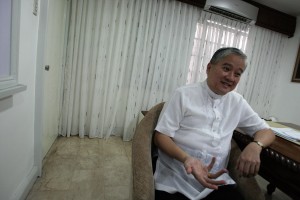
Lingayen-Dagupan Archbishop and CBCP president Socrates Villegas: Gospel of Life. INQUIRER FILE PHOTO
MANILA, Philippines–Catholic bishops on Wednesday reiterated the Church’s opposition to calls for the revival of the death penalty amid the recent spate of violent killings and other heinous crimes.
“The CBCP must, with full voice, express its position for life and against death… Our posture cannot be otherwise. The Gospel we preach is a Gospel of Life, but the position we take is defensible even on nonreligious grounds,” said a statement issued by Lingayen-Dagupan Archbishop Socrates Villegas, the president of the Catholic Bishops Conference of the Philippines (CBCP).
The CBCP issued the statement after several anticrime advocacy groups, including the Volunteers against Crime and Corruption (VACC), called for the revival of the death penalty in order to send a strong signal to criminals that the government does not tolerate heinous crimes.
“We are rightly appalled by the heinous nature of some crimes committed today… [but] detestable as crime may be, there is no justification at all for the state, as the prime educator of civil society, to send the erroneous message that human life is sometimes dispensable and disposable,” Villegas said.
The CBCP cited various reasons why it continues to reject the death penalty as a punishment for heinous crimes.
“Justice does not demand the death penalty… The aim of justice is the restoration of broken relations and the ruptured social coherence that follow from crime. Executing a human person does not contribute to any of these goals of justice,” Villegas said.
“There is something terribly self-contradictory about the death penalty, for it is inflicted precisely in social retaliation against the violence unlawfully wielded by offenders. But in carrying out the death penalty, the state assumes the very posture of violence that it condemns,” he added.
Villegas said the death penalty is cruel and inhumane in two senses.
“First, the terrible anxiety and psychological distress that come on one who awaits the moment of execution constitute the cruel and inhuman punishment that most legal systems today proscribe, including the Constitution of our country. It has been rightly said that the anticipation of impending death is more terrible a torture than suffering death itself,” he said.
“Second, the members of the family of the condemned persons, many times including children, are, for their lifetimes, stigmatized as members of the family of an executed person, bearing with them the price of a crime they never committed,” Villegas said.
The CBCP also cited as another factor the imperfections of the country’s justice system.
It noted how the erroneous evaluation of evidence has affected some cases, or worse, having some judges “betraying the dignity and nobility of their calling” by allowing “extralegal considerations to taint their judgments.”
“The death penalty, once executed, is irreversible and no repentance or regret can ever make up for the horrible injustice of a person wrongfully executed,” Villegas said.
The CBCP also pointed out that the country is mandated to reject the death penalty as a punishment of offenders under an international treaty.
“The Philippines is a state-party of the Second Optional Protocol of the Covenant on Civil and Political Rights, and the principal obligation we assumed under this international agreement is to abolish the death penalty. We cannot and should not renege on our international obligations, especially when these are not only lawful but moral,” it said.
Instead of demanding the revival of the death penalty, all sectors should work together in preventing the commission of heinous crimes, the CBCP said.
RELATED STORIES
US death row inmate ‘tortured’ in botched execution
Church opposes restoration of death penalty
VACC pressing for return of firing squad